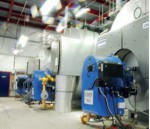Are you affected by the Medium combustion Plant Directive?
Published: 01 April, 2014
Anybody running combustion plant from 1- 50MWth Input is very likely to be affected by the Medium Combustion Plant Directive (MCP) from the European Union. David Kilpatrick director of the Combustion Engineering Association and council member Paul Whitehead talk to PWE about the implications for industry in the UK.
This new directive will probably come into force by the turn of the decade, this may seem like a long way off but it is in fact less than six years and it is estimated it will affect some 17,000 plants in the UK. The European Commission published its Clean Air Policy Package on 18 December 2013 (http://ec.europa.eu/environment/air/clean_air_policy.htm.) Within it, as expected, is a proposal for a Directive ‘on the limitation of emissions of certain pollutants into the air from medium combustion plants (MCP)’. It is being referred to as the “proposed MCPD” but note that it is a proposal which has to be negotiated amongst EU Member States. There is no certainty that it will emerge intact from that process, however, operators of MCPs need to think carefully now about what the proposal would mean and how it might better safeguard air quality in a proportionate manner.
The proposed directive covers all combustion plants with a rated thermal input (RTI) of between 1 and 50 MW. There are some exclusions, notably:
• plants which are subject to the Chapters in the industrial emissions Directive dealing with waste incineration or large combustion plants (aggregated to 50 MW and above);
• plants covered by the “eco-design” Directive (nominally less than 1 MW thermal input); and
• plants whose combustion gases are used for direct heating, drying or other treatment.
The proposed MCPD would require every individual plant to be registered with a “competent authority”. Within the UK, that could be the local authority or possibly the EA/SEPA/NIHES, although no decisions will be made until the Directive is finalised and ready to be transposed into UK law. Registration would require details of the type of plant, RTI and fuel(s) of each plant, and its expected operating hours and normal operational load.
New combustion plant legislation – the FAQs
Do you own or operate a large steam or hot water boiler? Or perhaps you have a standby diesel engine or a CHP plant? Before the end of this decade the EU plans to pass legislation that will require owners of any Medium Combustion Plants (MCP) to only purchase equipment that meets new emissions standards. And a few years later, emissions limits will apply to all existing MCPs as well.
CEA council member Paul Whitehead explains some of the main points of the proposed legislation in the following FAQs:
What is a ‘Medium Combustion Plant’?
Any individual piece of equipment that burns any fuel, with a very few specific exceptions, and where the rated thermal input (RTI) (i.e. gross fuel input) is between 1 and 50 MW. This applies to each individual unit, with no ‘aggregation’ of smaller units below 1 MW. Typically this means all steam boilers rated above approximately 1.3 tonnes steam per hour or the equivalent size of hot water boiler.
It will also apply to diesel or gas engine generators rated above approx 400 kVA and the equivalent size of turbine installation, and any other appliance that uses fuel to generate heat or electricity. Mobile plants (boilers/generators etc.) are also included if they are rated above 1 MW thermal input.
What are the exceptions?
• Plants covered by Industrial Emissions Directive Chapters IV or III dealing with waste incineration or large combustion plants respectively (aggregated to or individually 50 MW and above)
• Plants covered by the “eco-design” Directive (nominally less than 1MW thermal input)
• Plants whose combustion gases are used for direct heating, drying or other treatment
• Plants used solely to purify waste gases (eg thermal oxidisers)
• Plants used for propulsion/transport.
What pollutants do the emissions limits apply to?
Each individual combustion plant will have to meet Emission Limit Values (ELVs) for the production of Oxides of Nitrogen, Sulphur dioxide and dust (total particulate matter).
How many plants does this affect?
Approximately 17,000 in the UK (nearly half of them under 2 MW) and over 140,000 across the EU.
When does this come into force?
For new plants, the proposed legislation is expected to be in force well before the end of the decade, so only combustion plant items that comply with the planned ELVs will be allowed to be operated from the legislation implementation date.
For existing plants, those rated greater than 5 MW would have until 1 January 2025 to meet the proposed emission limits, and smaller plant from 1-5 MW RTI would have until 1 January 2030.
Who is going to check this legislation is properly applied?
Each EU country will nominate a ‘Competent Authority’ to operate a system of MCP registration and oversee the proper application of this proposed legislation. In the UK this may be either the Local Authority or the EA/SEPA/NIHES; a decision on who is to do this work will be made before UK implementation.
What do we have to do to register?
Each plant owner will be required to tell the Competent Authority about each combustion plant, giving details of owner name and address, plant rating and fuel(s) used, operational start date and operating hours, normal operating load, emissions limits applicable and achieved, and other relevant data.
What if my plant only operates intermittently?
If you can prove (by keeping verifiable records) that one of your plant items only operates for less than 500 hours per annum it will not come under the proposed emissions legislation, but you will still have to register it with the Competent Authority.
When do I have to measure the emissions from my plant?
It is expected that each plant will have measurements taken of the relevant pollutants within 3 months of registration and thereafter annually if the MCP has a RTI of 20 MW or more and every three years if less than 20 MW RTI.
Who is going to do all these measurements?
This will be decided when the legislation is transposed into UK law, but it may be an extension of the current MCERTS programme. Whatever happens, the measurements will have to be taken in accordance with international standards and be verifiable and audited.
What if I burn lots of different fuels or a fuel mix?
The ELVs for that unit will be proportional to the percentage of the different fuels used in the measurement period, i.e. if you burn natural gas for 80% of the time and light oil for the remainder of the time the ELV will be calculated in that ratio.
What if I remove an old unit and replace it?
The replacement unit becomes a new MCP and the new MCP ELVs apply from the date of putting it into operation.
What happens if I cannot get natural gas that I normally use?
An allowance of 10 days per annum is made for using alternative fuels without penalty if gas is unavailable.
If I am in a poor air quality zone are the emission limits the same?
Probably not – the competent authority has the power to impose stricter limits in such areas.
What happens if my combustion plant cannot be fitted with a combustion system that meets the ELVs?
The intention of the legislation is to control MCP emissions by primary abatement measures in order to help keep costs under control, but if ELVs cannot be met by this method the owner of the plant may be forced to consider a different, less polluting fuel, or a means of secondary abatement such as an ESP or filter for dust control or SNCR/SCR abatement methods for NOx control. The operation of any secondary abatement plant shall be continuously monitored.
What happens now?
Defra has set up a MCP Stakeholders Group and this group is helping formulate a proportionate response to the proposed legislation for discussion with EU Member States. Data regarding the performance of combustion plants that are likely to be affected is urgently required, from manufacturers and operators alike, in order that the UK position can be adequately and fairly represented. Please contact the CEA if you have any information regarding MCPs that might be useful.
For further information please visit www.cea.org.uk





 The CEA reports one of the single most important directives for many years in the combustion industry is about to become EU law and will soon be transposed into UK law. Owners or operators of any combustion plant with a thermal input of between 1MW and 50MW will be affected. This means anyone with a boiler generating around 1.5 tonnes of steam or more, or using a CHP or diesel generator of around 500kVA or more, will need to know about this directive. There are estimated to be at least 15,000 such plants in the UK alone.
The CEA reports one of the single most important directives for many years in the combustion industry is about to become EU law and will soon be transposed into UK law. Owners or operators of any combustion plant with a thermal input of between 1MW and 50MW will be affected. This means anyone with a boiler generating around 1.5 tonnes of steam or more, or using a CHP or diesel generator of around 500kVA or more, will need to know about this directive. There are estimated to be at least 15,000 such plants in the UK alone.
